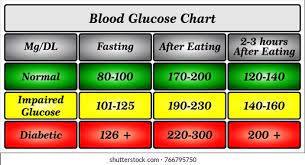

Eating and moving for blood sugar control may not be at the top of your reasoning list, but it should be! Your personal state of blood sugar regulation can determine your productivity, levels of inflammation, weight control, mood, and cognition. Maintaining the homeostatic level of blood glucose (sugar) is imperative for all systems and cells to work as intended, and the body has a complex system of checks and balances to maintain this preferred level at all times – no matter what.
Some quick and dirty science: From the onset of a meal (balanced, and containing some carbohydrate), a hormone called insulin goes to work to immediately utilize and store the energy from food – systematically lowering blood sugar to normal levels. During times when no energy is acquired from food (fasting overnight or between meals), the counter hormone glucagon, chimes in to ensure that there is enough glucose in the blood to supply the cells, tissues, and organs with the necessary energy needed to maintain life. When this system of checks and balances gets overworked, it can go awry and lead to insulin resistance and eventually type 2 diabetes.
Even those at low risk of developing type 2 diabetes can benefit from guidance to support a well-functioning blood sugar control system, because steadied blood sugar means the body is grounded on a physical level to provide lasting energy to do the things you need to do and the things you want to you. Steadied blood sugar throughout the day is also key to supporting mood stabilization. Anxiety or significant lethargy can be remedied by eating and moving to avoid dramatic blood sugar swings. Adopt these 4 principles to avoid the problematic spikes and crashes of a blood sugar roller coaster.
1) Reduce (as much as possible) high-refined carbohydrates. These include white flour items such as highly-refined pasta or bread, packaged food such as cookies, chips, candy, crackers, and baked goods. These foods are quickly digested, enter the bloodstream readily, and spike the blood sugar very high. Have you ever experienced a sugar crash? That is the low-low over-correction, following the high-high blood sugar level from the sweet, refined food. These dramatic fluctuations can lead to mood swings, incessant hunger, and over-time, mis-management of the precious control system.
2) Eat in distinct periods, followed by distinct non-eating periods. Grazing behavior, or eating often throughout the day is counter-productive to blood sugar management. It is the in the periods of non-eating that blood sugar is allowed to stabilize to normal and insulin is given an important rest. Start your day with breakfast within one hour of waking, and then eat every 3-4 hours in your day. A sample eating schedule may look like this: breakfast at 7am, lunch between 11-12pm, afternoon snack between 3-4, and dinner at 7pm. Compose your meals with adequacy and balance to keep you full for 3-4 hours, until the next meal. Try as best as you can to support a 12 overnight fast because this is when important housekeeping within the body takes place, including the hormones for appetite regulation.
3) When you do eat carbohydrates (starchy vegetables, whole grains, or fruit), always pair it with a source of protein and fat. All carbohydrates impact blood sugar and invoke the release of insulin. However, it is not necessary to avoid all carbohydrates (and never recommended), just prioritize the complex kinds (those with fiber intact), and pair them with a complementary food source of fat and protein – examples of this combination are below. By having complex carbohydrates within composed meals for instance, the spike in blood sugar is lessened and therefore, the need for insulin is stymied.
4) Enjoy 30-60 minutes of moderate exercise on most days of the week. Exercise helps sensitize your muscle cells to insulin and thus promotes enhanced uptake of blood sugar for immediate use. Walking, especially after meals, helps digestion and lowers blood sugar. Fit in walking and other movement spontaneously within your day by taking the stairs, parking farther away from an entrance, getting off the bus earlier than usual, or adopting a walking break to clear your head.
If you are pre-diabetic, or using medication to support lowered blood sugar, these practices may be helpful and particularly supportive, but your case is always unique. Reach out to myself or another registered dietitian to learn other specific practices for naturally supporting blood sugar levels.
Examples of blood sugar-friendly snacks include:
- 1 brown rice cake + 1-2 tablespoon nut butter + banana slices
- 1 whole piece of fruit + small handful of almonds
- 1 whole piece of fruit + 1-2 tablespoons of nut butter
- 1 whole piece of fruit + 1 hard-boiled egg
- Hummus with cut veggies
- Greek yogurt + 1/2 cup berries
- Cottage cheese + 1/2 cup cut fruit
Endhistha Lafreshin





